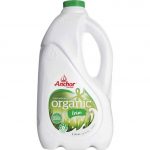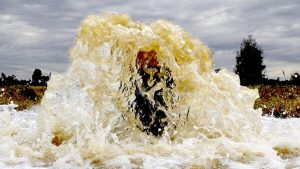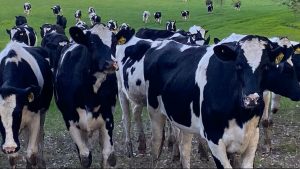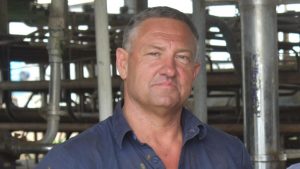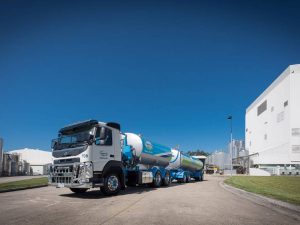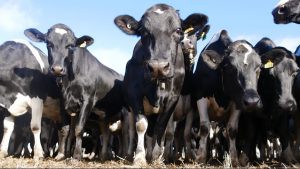
Key points:
Dairy farmers have started flying the Eureka flag in a movement against high water prices, water fees and low water allocations
They say they have been taxed out of the system
About 400 dairy farms have closed in the past four years in the Goulburn Murray region
They say they are being ripped off, and that towns like Cohuna in northern Victoria are dying as dairy farmers pull out of the industry.
Miners flew the flag at the Eureka Stockade in the 1854 in their fight against gold taxes and license fees.
Russel Crichton is a retired farmer from the area and is helping lead the campaign.
“We’ve been taxed out of the system, that’s the reality,” he said.
“It [the flag] was chosen because it is a revisit of that.
“Us farmers, just like the miners, effectively have been taken out of business.”
Farmers packing up and getting out
Murray Dairy said the number of dairy farms across the Goulburn-Murray has dropped from 1,300 to 900 in the past four years.
Its chief executive Jenny Wilson said $1 million at the farm gate created 6.5 full-time jobs and 80 per cent went back into the local economy.
And just like miners during their rebellion against gold taxes in 1854, dairy farmers want changes to the way the system is managed.
Jodie Hay is a fifth-generation dairy farmer in Cohuna who says she is barely hanging on and wants justice.
“Traditionally, we only ever owned 50 per cent of what we used and relied on the temporary market to run our business,” she said.
“Last year we paid for 100 per cent of water and only got 66 per cent.”
John Keely is also a Cohuna dairy farmer and the vice president of the United Dairyfamers of Victoria.
He said most dairy farmers are now selling beef or trading water.
“There used to be seven farms along this road,” he said.
“They’ve been bought up by their neighbours and now there’s two.
“Dairy does generate a lot of income for the region, more than any other commodity as far as dollars that are returned back into it.”
Gannawarra Shire Council’s manager of economic development, Roger Griffiths, said the Cohuna region has taken a hard hit because of the price of water over the past five years.
“One of our strategies is to diversify the economy, so to diversify the ag sector,” he said.
“The council has medicinal cannabis, intensive poultry and pig development.
“We’ve got mineral sands, we’ve got a thousand-acre viticulture development, we’ve got a lot of horticulture deployment in cotton and stone fruit.”
Up and downs of a local economy
The National Herd Development said 44 farms have closed in the Torrumbarry irrigation area in the past 18 months, leaving 120 behind.
It said the farms milked a combined 11,500 cows and more farms have been sold off as farmers attempted to reduce numbers.
Mr Keely said the whole service industry was reliant on the diary industry.
“The town’s reliant on it and the lack of security on water is a major part of the lack of surety that we’re going to have water that is affordable to help the farmers thrive and prosper,” he said.
And just like the Goldfields Commission that heard the problems and grievances of miners, farmers have been renewing their calls for a royal commission into the Murray-Darling Basin Plan.
In a statement, the Federal Water Minister Keith Pitt told the ABC the Commonwealth Government did not support a royal commission into the basin plan.
He said the plan was one of Australia’s most scrutinised policies.
“Since 2010, the plan has been examined by at least nine separate federal inquiries, several state-based inquiries, and around 70 more independent reports and inquiries into elements of the plan,” Mr Pitt said.
But Ms Hay said farmers have gone to Canberra to provide solutions.
“We really want a lot more than lip service and we really need these things to be put into action,” she said.
“We’ve seen of late how quickly legislation can be implemented where there is a desire and we really need that to happen in the water space as well.
“We really need to get that reliable water availability back.
“We need to have full allocations, we need the heat to come off the temporary water market, we need our policymakers to really listen to what we’re saying.”
Victorian Water Minister Lisa Neville said the Government always stood up for farmers and their communities.
“We oppose any further buybacks of water,” she said.
“At the most recent Ministerial Council we secured agreement that where would be no further water recovery unless there were proven benefits for farmers and communities.”
Calls for a royal commission
Mr Pitt said any of the six shareholding governments involved in the basin plan were entitled to call a royal commission if they choose.
Ms Hay said flying the Eureka flag was just the start of the rebellion.
“We’re demanding a royal commission into the Murray-Darling Basin Plan, and we’re looking at do we not pay our water fees, a start-your-pumps day regardless whether there is water,” she said.
And as the movement grows its founder hopes politicians take notice of the movement.
“This is Eureka, the flag says it all, doesn’t it?” Mr Crichton said.
“‘Bad law, resistance is duty’, and governments made the law, they can change the law in a bloody day.”


